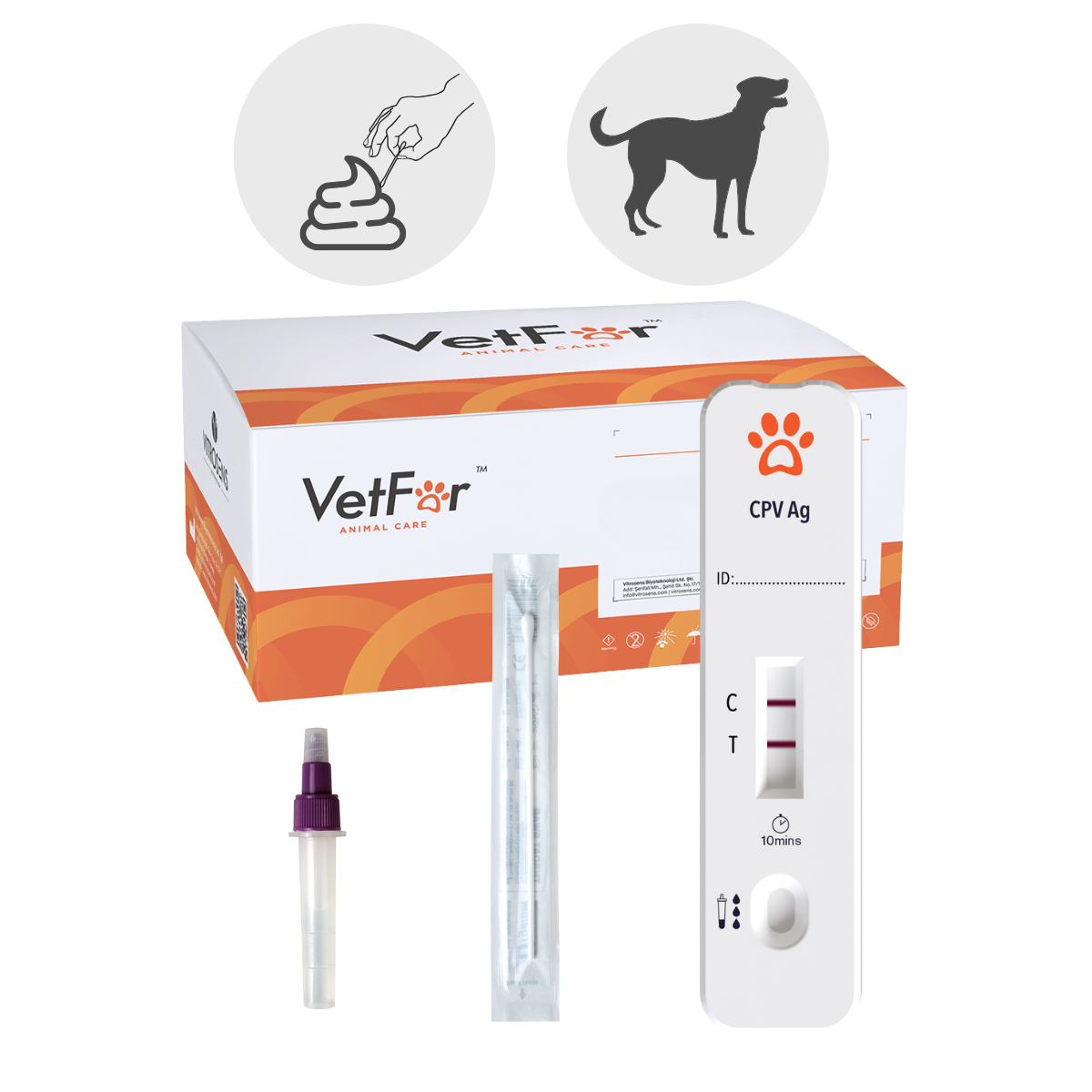Canine Parvovirus (CPV) Antigen Test
The VetFor™ CPV Antigen Rapid Test is intended for the rapid detection of specific canine parvovirus (CPV) antigens in canine fecal samples.
55,00 €
| Quantity | Price | Discount |
|---|---|---|
| 3-5 | 53,35 € | 3% |
| 6-9 | 51,70 € | 6% |
| 10+ | 49,50 € | 10% |
| Sample type |
Faeces |
|---|---|
| Target specie |
Canine (Dog) |
| Target |
Canine Parvovirus (CPV) |
| Packaging unit |
10 Tests |
| Sensitivity |
98,15 % |
| Specificity |
100 % |
The VetFor™ CPV Antigen Rapid Test is a veterinary in vitro diagnostic test for the rapid and reliable detection of Canine Parvovirus (CPV) in canine fecal samples.
The test is based on the principle of the lateral sandwich immunoassay and provides clear results in a short time. The ready-to-use kit contains all the necessary components for performance and is intended for use by veterinary professionals.
Product details
- Test type: Lateral sandwich immunoassay
- Target pathogen: Canine parvovirus (CPV)
- Sample material: Fecal samples from dogs
- Result time: Rapid test with direct evaluation after 10 minutes
- Detection limit: 5 × 10³ TCID₅₀ / mL
- Storage conditions: 2 – 30 °C
- No cross-reactions with CDV, CCV, ICH or PI2
Performance data
-
Sensitivity: 98,15 %
-
Specificity: 100,0 %
-
Accuracy: 99,12 %
Content
- 10 test cassettes (1 test/bag)
- 10 disposable bottles with 1 mL dilution solution each
- 10 sterile disposable sample swabs
- 1 instruction manual
For professional use only!
SHELF LIFE AND STORAGE
- The test kit must be stored at a temperature between 2 °C and 30 °C and a relative humidity of 40% to 60%. All components must be brought to room temperature before testing.
- Do not open sealed pouches and test kits until immediately before use.
- The test is stable until the expiration date. Do not use the test kit after the expiration date. The expiration date is indicated on the label/packaging of the sealed foil pouch.
- Do not expose the test kit to direct sunlight.
NOTES
- For in vitro diagnostic use only.
- For optimal test results, the manufacturer's instructions should be followed precisely.
- The tests should be conducted in compliance with biosafety measures and with protective clothing.
- The test kits must be kept in their sealed packaging until use.
- Do not use the test kit if the pouch is damaged or the seal is broken.
- The components of the test kit must not be reused.
- All components must be brought to room temperature before testing.
- The test kit may only be used up to the indicated expiration date.
- The components of this test kit have been tested as a standard batch.
- Do not exchange or mix components from different test kits.
- Do not touch the uncovered areas of the membrane in the test cassette.
- Inadequate or incorrect sample collection as well as improper storage and transport conditions may falsify the test results.
- All components of the test kit should be disposed of as infectious material.
You must be logged in to post a review.
Background on Canine Parvovirus (CPV)
The Canine Parvovirus (CPV) is a highly infectious pathogen that primarily affects the gastrointestinal tract of dogs. The virus belongs to the Parvoviridae family and is an unenveloped single-strand DNA virus. Due to its high environmental resistance, it can survive in the environment for months and is primarily transmitted through the fecal-oral route. Unvaccinated puppies aged four to twelve weeks are especially susceptible to infection.
Disease Course and Symptoms
The incubation period is typically 3 to 7 days, after which the first clinical symptoms appear. Typical signs of a CPV infection include severe vomiting, bloody diarrhea, fever, loss of appetite, and lethargy. In severe cases, the disease can be fatal within a few days, especially if early treatment is not administered. Dogs with weakened immune systems and young puppies without adequate vaccination protection are particularly affected.
Recent Developments
In recent years, new CPV variants (CPV-2a, CPV-2b, and CPV-2c) have been identified, which differ slightly in their pathogenicity. Studies show that CPV-2c is becoming increasingly widespread worldwide and may have increased virulence. There are also indications that some of these variants can infect cats, expanding the zoonotic significance of CPV.
Prevention
Vaccination is the most effective preventive measure against Canine Parvovirus. The Standing Committee on Vaccination in Veterinary Medicine (StIKo Vet) recommends primary vaccination for puppies at 8, 12, and 16 weeks, followed by a booster shot at 15 months. After that, the vaccination should be renewed every three years to ensure long-term protection.
In addition, hygienic measures are crucial to control the spread of the virus. In households with a CPV infection, contaminated surfaces should be thoroughly cleaned with virucidal disinfectants, as conventional cleaning products are often ineffective against the resistant virus.
References
-
Standing Committee on Vaccination in Veterinary Medicine (StIKo Vet) at the Friedrich-Loeffler-Institute (2022). Guideline for the Vaccination of Companion Animals, 5th Edition. Available at: https://www.openagrar.de/servlets/MCRFileNodeServlet/openagrar_derivate_00044276/Impfleitlinie-Kleintiere_2022-01-01_ba.pdf
-
Decaro, N., & Buonavoglia, C. (2012). Canine parvovirus—A review of epidemiological and diagnostic aspects, with emphasis on type 2c. Veterinary Microbiology, 155(1), 1-12. Available at: https://doi.org/10.1016/j.vetmic.2011.09.007
-
Pérez, R., et al. (2012). Evidence of a new canine parvovirus variant in dogs in Uruguay. Journal of Clinical Microbiology, 50(11), 4146-4151. Available at: https://doi.org/10.1128/JCM.01827-12
-
Mylonakis, M. E., et al. (2016). Canine parvoviral enteritis: An update on the clinical diagnosis, treatment, and prevention. Veterinary Medicine: Research and Reports, 7, 91-100. Available at: https://doi.org/10.2147/VMRR.S80971
Hinweis: Translated from German version.


Reviews
Clear filtersThere are no reviews yet.